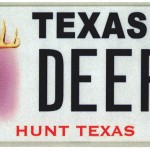New Rules for Boaters and Fishers After Zebra Mussels Spread in North Texas
View Texas Zebra Mussels in a larger map
Update: The Texas Parks and Wildlife approved new rules today to prevent the spread of Zebra Mussels that will have an impact on boaters and fishers in 17 North Texas counties. “Anglers and boaters leaving or approaching public water will be required to take all reasonable steps to drain all water from their vessel, including live wells, bilges, motors, and any other receptacles or water intake systems that resulted from contact with public water,” the department says. ”
As a result of this rule, live fish could not be transported in water that comes from the water body where they were caught, which could impact off-site tournament weigh-ins. Personally caught live bait could be used only in the water where it was caught.” The new rules apply to any public waters in the following counties: Collin, Cooke, Dallas, Denton, Fannin, Grayson, Hood, Jack, Kaufman, Montague, Palo Pinto, Parker, Rockwall, Stephens, Tarrant, Wise, and Young counties. The rules will go into effect either December 10, 2013.
Original story, September 12, 2013:
If you boat or fish around Dallas-Fort Worth, your lake trips next summer could take a little extra time: new rules that could help prevent the spread of invasive zebra mussels were released for public comment this week, and if approved, boaters in 17 counties in Northeast Texas would be affected.
Zebra mussels have spread rapidly in the region after originally being discovered at Lake Texoma in 2009. Since then, they’ve been found in other lakes, like Lake Bridgeport joins Lake Texoma, Lake Ray Roberts, and Lewisville Lake. (You can what lakes have zebra mussels in the map above by Michael Marks.)
The mussels “can have serious economic and recreational impact to Texas reservoirs,” according to the Texas Parks and Wildlife Department (TPWD). (And no, you can’t eat them away.) The mussels can clog water intake systems, power plant cooling infrastructure, and damage fish habitats.
The mussels spread by “hitching a ride,” TPWD says, on boats that have been in infested waters. Until now, the parks department has addressed the issue with a policy of making boaters on infested lakes (and others connected to them by rivers) drain their boats. The new strategy seems to try to get a step ahead of the mussels: by making boaters drain their boats whether a lake is infested or not.

Courtesy of NOAA Great Lakes Environmental Research Laboratory
Zebra mussels have spread rapidly in Northeast Texas lakes.
The new rules would require “all boats operating on public water” in the 17-county area to be completely drained after use. “This would apply to all types and sizes of boats, whether powered or not, personal watercraft, sailboats, or any other vessel used to travel on public waters,” the commission said in a statement. Fishing would also be impacted, as live fish “could not be transported in water that comes from the water body where they were caught.” (There are rules for bait, too.)
What’s so threatening about a mussel? Here’s what we wrote last year in our list of the ‘Top Ten Invasive Species in Texas:’
“Originally from the Black and Caspian Seas, these quick-breeding mollusks have recently invaded several Texas lakes, most profoundly Lake Texaoma, and they threaten to take over the Trinity River Basin next. Zebra mussels have caused alarming declines in fish, birds, and native mussels by over-absorbing phytoplankton, an essential food source for many aquatic species. Its high rate of filtration also leads to increased sunlight penetration, raising water temperatures and the depth at which that light penetrates the water. Zebra mussels also negatively impact the aquatic industry. They can adhere to just about any surface, including pipes, boats, boat trailers, buoys and dinghys, and once they do, they’re permanently secured. In several instances, they’ve been reported to have sunk entire buoys and destroyed fishing equipment.”
The commission is considering the new rules under new authority granted during the last legislative session.
The 17 counties affected encompass the Dallas-Fort Worth metroplex and much of the surrounding area: Collin, Cooke, Dallas, Denton, Fannin, Grayson, Hood, Jack, Kaufman, Montague, Palo Pinto, Parker, Rockwall, Stephens, Tarrant, Wise, and Young.
The proposed rules are open for public comment through November 5th.

